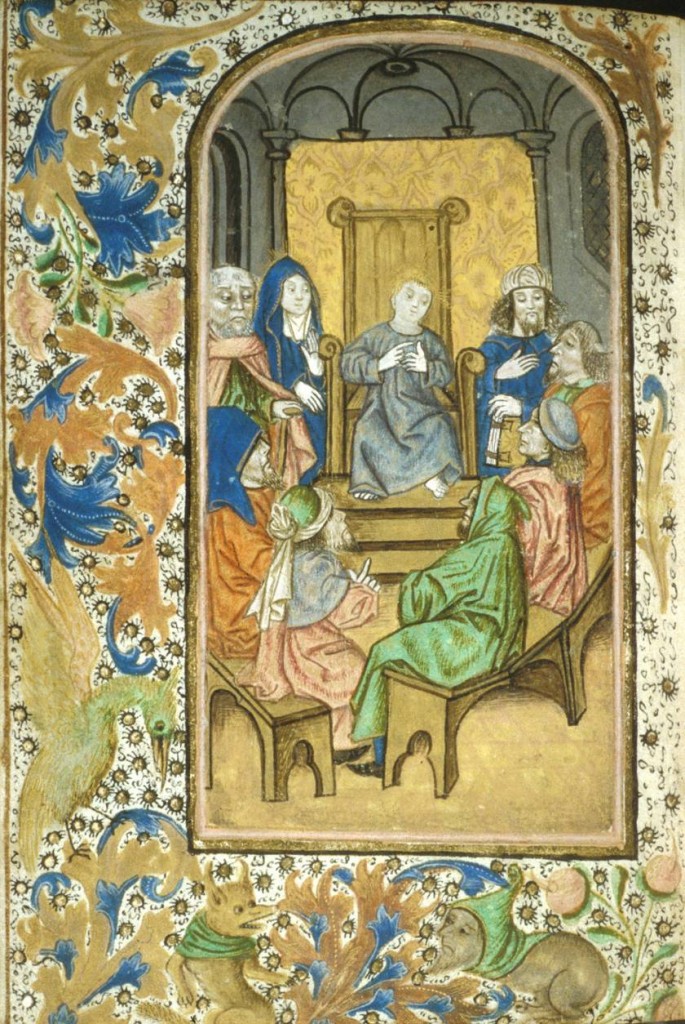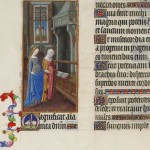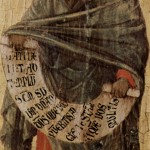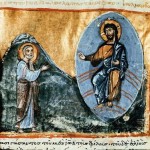
What It’s About: This is an episode from the life of Samuel, from the time when he was a boy, and his mother used to make him what appear to be liturgical garments. It’s a touching if odd story–the kind of detail that both inspires because of his mother’s care in making him a robe each year, and strange because that is the detail that got passed down for millennia. It’s a story of the sort that you find in the Hebrew Bible, of a doting mother helping to set up her son for service to God. The other major example is Sampson, whose mother dedicated him in a very particular way.
What It’s Really About: This passage is in the lectionary this week because of the particularity of the Christian calendar. I have always objected to the long, drawn-out Lenten season, and still more to the longer, more-drawn-out ordinary time (or season after Pentecost), when Advent and Christmas get such short shrift. The entirety of Jesus’ childhood typically gets elided with the story from Luke (below) and these words, written about the life of Samuel, which are meant to stand in for the growth and development of Jesus: he “continued to grow in both stature and in favor with the Lord and with people.” I can remember reciting these words at summer camp, and we were absolutely supposed to think of Jesus, not Samuel. Since the season between Jesus’ birth and his baptism is so short, we cram it all in here, instead of lingering at the side of the manger as we might.
What It’s Not About: It’s not really about Samuel; for Christians, this account has been nearly completely taken over by its association with Jesus.
Maybe You Should Think About: Why do the gospel accounts omit so much of Jesus’ childhood? The (in)famous Infancy Gospel of Thomas notwithstanding, early Christianity seemed to be agnostic about Jesus’ time between his birth and the beginnings of his public ministry, with the exception of the Luke story below. There are probably several good reasons for this: that they didn’t know the details of his childhood, that they were unimportant to his message and his ministry, etc. But it never fails to raise questions, and the speculation is fun to engage with.
What It’s About: Colossians is among the disputed letters: those that scholars cannot agree on with regard to whether Paul wrote them. More liberal scholars tend to doubt that Paul wrote Colossians, and more conservative ones tend to accept that he did. This section bears the marks of Pauline authorship; the author is trying to exhort the readers toward strong community and individual character, in the same way Paul often does in his authentic (or undisputed) letters. But the verses just after the selection for the lectionary for today–verses 18 through 21–are exhibit A for why some people don’t accept Pauline authorship. The language that is found there seems to many (including me) to be profoundly un-Paul-like; the author is advocating for family ethics that run counter to his attitude toward women elsewhere and his general lack of concern about durable social structures. (Remember, Paul thought that the eschaton was immanent).
What It’s Really About: If this letter was indeed written by someone other than Paul, then it makes sense that the author would mimic some of Paul’s style and vocabulary, which seems to be happening here. And it makes sense that the author would leverage Paul’s reputation and voice to accomplish things that the author assumed that Paul would have cared about or believed. So, it’s easy to imagine a scenario in which someone wrote this in Paul’s name after his death (which would not have been particularly dishonest or unusual in antiquity, no matter how it looks to our eyes) to carry on what that person saw as the core of Paul’s mission. The bit about women’s submission–verses 18 and 19–would have then seemed to the author to have been the kind of thing Paul would have said, had he lived long enough. Of course, different people had different ideas of what Paul would have said, and you only have to look to differing interpretations of Christianity today to understand that different people can interpret things in wildly varying ways.
What It’s Not About: It’s not really about Christmas. I struggle to understand what the connection is to this week’s lectionary.
Maybe You Should Think About: Depending on how you come down on the question of authorship, this letter raises interesting questions for you. Scripture was codified over a long period of time along several different criteria, including apostolic authorship. Things got to be in the New Testament because they were supposed to have been written by apostles. If this is not Paul, then, but rather another very early (late first century, early second century) Christian, then does it have less authority for us? Or is authority derived from the book’s place in the canon, regardless of the messiness of its authorship?
What It’s About: This is it: the sole account we have, in a canonical gospel, of the period between Jesus’ infancy and his baptism. (You could make a case for the Egypt narratives in Matthew being a little later than “infancy,” I guess, but you get the point). Here we have a glimpse into the family activities of Joseph and Mary; they were accustomed, it seems, to going to Jerusalem for Passover. I can imagine that Jesus would have looked forward to this, despite all the walking, as it was an opportunity to get to a big city. But that’s not really the interest that Jesus displays in the story. Instead of checking out the city sights, or taking advantage of the opportunity to check out the newest toys in the markets, the 12 year old Jesus beat a path to the temple to run with the big dogs. He took up with the teachers who gathered at the temple, and by all accounts he was holding his own with them when his (frantic) parents found him. So, based on this account, we get a sense that Jesus was already, at age 12, a precocious and knowledgeable kid, able to learn and even teach among the intellectual leaders of the temple.
What It’s Really About: I think it is extremely interesting to ask how this made its way into Luke’s gospel. It’s found only here, so we can assume it came from Luke’s special source(s), which might have been his own experiences. It might also have been someone else’s experiences, of course, or a written source. But at any rate, Luke has this tidbit from Jesus’ childhood, and he inserts it here…why? To demonstrate Jesus’ precociousness? To humanize him a little? To add some depth to Mary and Joseph as parents? It’s probably some combination of these.
What It’s Not About: This is not about helicopter parenting, that’s for sure. 12 years old in antiquity was not the same as 12 years old today; in antiquity that was the cusp of adulthood and even sometimes marriage. But it’s still somewhat shocking to see Joseph and Mary being so lax with their son. And I think verse 48, if treated as a line of verbatim dialogue (which it isn’t), is hilarious. Can you imagine saying that to your child that you had just lost for a few days? “Great anxiety” is probably not the phrasing I would have used; after hugging my kid for a good thirty minutes, I probably would have been a bit less formal with my words. But that’s probably just one of many, many reasons I wasn’t chosen to be part of the holy family.
Maybe You Should Think About: That last line of this passage, the one that quotes the 1 Samuel above, is an act of exegetical precision by Luke. Luke is not an idiot, and he doesn’t do much that is careless. He is explicitly drawing our attention to the connections between Jesus and the holy men of the Jewish tradition, and he is asking us to let their developments stand in for Jesus’ development. Our next word from Luke is about John the Baptist, and so Jesus is, at that point, an adult. Luke wants us to understand that Jesus grew up into a good and righteous person, but he does so in kind of a scriptural version of a montage. “And then he grew up,” Luke is saying. “Time to get to the good stuff.”
This is, as I said at the top, one of my critiques of the Christian calendar, but also then it is a critique of the New Testament. I wish we spent more time on the incarnation (which I find incredibly theologically rich), and less time on the passion, crucifixion, and resurrection (which I find somewhat less fecund). But that’s just a personal preference; this text from Luke sets us up well for what is coming in the weeks ahead: Jesus’ baptism, and his public ministry, and soon enough, his journey to the cross.












